
The West Africa province of the Islamic State has claimed responsibility for the killing 20 Nigerian soldiers and the execution of nine more soldiers that were captured in various operations, according to Reuters.
The group behind the attacks emerged in 2002 under the name Boko Haram (“Western education is forbidden”), as part of a growing wave of anti-government sentiment in Nigeria’s Muslim-majority northern regions. In 2014, the group pledged allegiance to Abu Bakr al-Baghdadi, leader of the Islamic State of Iraq and Syria —otherwise known as Islamic State. Since that time, Boko Haram has rebranded itself as Islamic State – West Africa Province, while a smaller faction of the group has refused to align itself with the ISIS and continues to operate under the name Boko Haram.
In an English-language statement posted online on Wednesday, the ISIS-affiliated faction of Boko Haram said that its fighters were responsible for the deaths of 20 Nigerian Army soldiers, who were killed on Monday in Gubio, a town located in Nigeria’s extreme northeastern Borno State. Reuters cited an unnamed “security source and a humanitarian worker”, who said that the insurgents attacked a military barracks on the outskirts of Gubio late on Monday evening. According to the report, the attackers used motorcycles and non-standard technical vehicles, or ‘technicals’ —open-backed pickup trucks mounting heavy weapons. The attack was followed by an hour-long shootout between the Nigerian Army forces and the insurgents, which resulted in the soldiers retreating, leaving behind the bodies of at least 15 troops, said Reuters. On Wednesday, the Islamic State released a separate video that claims to show the execution of nine captured Nigerian soldiers. According to Reuters, the soldiers in the video disclose their names, rank and unit, before they are executed by masked militants. At the end of the video, a group of Islamic State fighters is shown pledging allegiance to al-Baghdadi. The video concludes with footage of artillery, armored vehicles and tanks, and even boats, which the Islamic State claims to have captured from the Nigerian military.
This development is bound to increase skepticism about the Nigerian government’s repeated claims that it has been able to quell the Islamist insurgency that plagued the country’s northern regions for the past 15 years. In late 2015, the Nigerian government proclaimed the end of the Islamist insurgency after its troops destroyed all of Boko Haram’s camps in Borno State. However, the group appears to have reinvented itself and to have been able to use its new affiliation with the Islamic State to attract more funding and fighters during the past two years.


